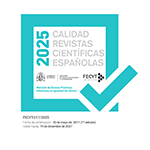'¿Cuánto valen tus manos?': Complejizando la prevención de riesgos laborales del sector de la construcción de Barcelona
Resumen
Históricamente, la construcción ha sido un sector intensivo en fuerza de trabajo y, aún hoy, los cuerpos de los obreros siguen siendo la principal fuente de creación de valor dentro del sector. Debido a esto, la tensión entre productividad y salud está fuertemente integrada en el modo de producción. Este artículo partirá de una investigación etnográfica llevada a cabo en Barcelona y mostrará cómo la aplicación de cierta legislación en materia de prevención y la crisis económica de 2007 acaban generando un escenario analíticamente interesante para observar cómo se significan y se gestionan culturalmente los riegos y la siniestralidad laboral por parte de los obreros. Este contexto también permite un estudio crítico del actual marco epistemológico desde el que se conciben los riesgos laborales, dicho marco se erige sobre la individualidad, la racionalidad, la objetivación y la mercantilización. Como alternativa, propondré un enfoque basado en la noción de poder, que nos permitirá destacar ciertos procesos de asunción de riesgo que, habitualmente, quedan invisibilizados.
Descargas
Descarga artículo
Licencia
La Revista de Antropología Social, para fomentar el intercambio global del conocimiento, facilita el acceso sin restricciones a sus contenidos desde el momento de su publicación en la presente edición electrónica, y por eso es una revista de acceso abierto. Los originales publicados en esta revista son propiedad de la Universidad Complutense de Madrid y es obligatorio citar su procedencia en cualquier reproducción total o parcial. Todos los contenidos se distribuyen bajo una licencia de uso y distribución Creative Commons Reconocimiento 4.0 (CC BY 4.0). Esta circunstancia ha de hacerse constar expresamente de esta forma cuando sea necesario. Puede consultar la versión informativa y el texto legal de la licencia.












